6 Things I’ve Learned from my Second Year Living in Berlin (away from Singapore)
In a few days it will be my second full year having relocated to Berlin. A lot has happened. A full year of grappling with covid, for one. And our first child was born here last month! Here are some of my learnings from the past year.
You can read my first year reflections here.
1. A welfare system provides peace of mind, and it’s priceless
Being Singaporean, I’ve been brought up to see everything from an economic point of view. I can’t shake it off even when I want to — it’s like a pair of permanent contact lenses. The only respite is in Berlin, away from everyone I know, immersed in an environment completely different from the one I grew up in. Even here, I’m haunted by my upbringing.
On the occasions that I break free from evaluating everything as a cost-benefit transaction, I see just how tiring it is to live like that. I just think, you don’t need to calculate everything.
But, in a place like hyper-capitalistic Singapore, I don’t see that people have a choice. You have to be calculative. You have to take all costs into account. Because if you don’t, you just might not be able to afford things that you really need, like regular and emergency healthcare, or food to keep your family fed during an economic crisis brought on by, say, a new coronavirus.
In Germany where I’m currently based, I’m receiving more or less equal treatment as citizens (in terms of public insurance, on paper and in practice). Here, I just pay my taxes and know that the welfare system has got my back. Mine and my wife’s and my newborn child’s.
Seriously, I work one job and my statutory health insurance covers both of them at no additional cost to me. And this is the way it should be because, in reality, a family is literally on the same boat. If it sinks, everyone goes down.
Here are some examples of things during my wife’s pregnancy in 2021 that have been stress-free in Germany but would have been stressful in Singapore:
- Considering whether to get a custom pair of compression stockings to deal with the painful water retention that my wife was experiencing. The tailor-made stockings were made and paid for by our health insurance. I didn’t even need to submit a claim.
- We had a midwife who came regularly to visit my wife during her first pregnancy and 2-3 times a week after birth for the first month to give medical advice, assurances, and tips on how to alleviate pain, prepare for birth, and so on. Also paid for by insurance. Again, no need to submit claims.
- Gynaecologist visits throughout the pregnancy were also paid for. You only pay for additional tests that you want to do that are considered non-essential. The list of non-essentials is fair. And you guessed it, no need to submit claims.
- In the end, delivering our baby at a public hospital was also covered by insurance. Yes, no claims needed.
I share these examples because they’re freshest in my memory, but there are other instances too, and overall, they make me feel like I am living in the most humane part of the world. If you are gainfully employed and anyone in your family falls sick, you will be cared for.
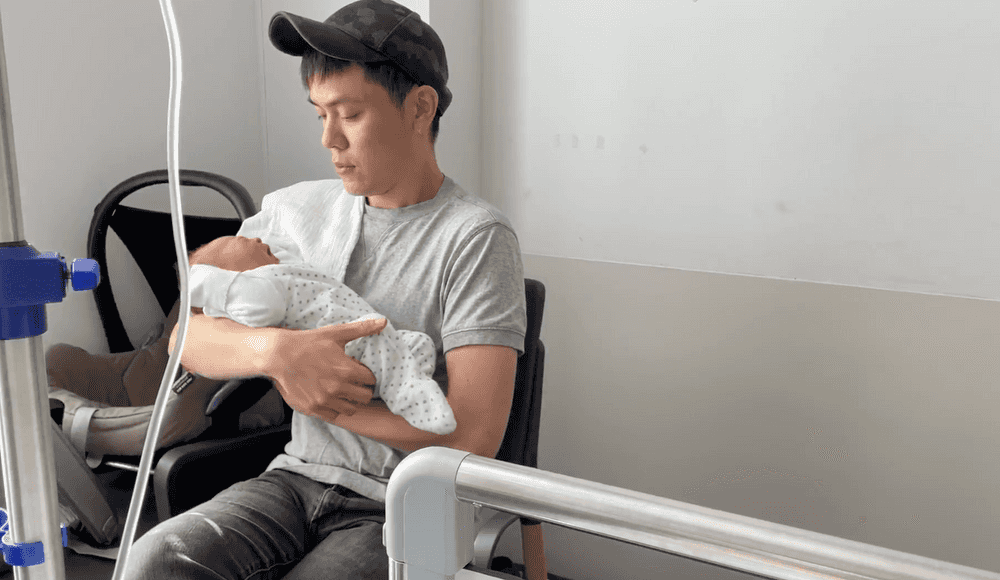 That’s me learning how to carry my two day old daughter at the public hospital!
That’s me learning how to carry my two day old daughter at the public hospital!
It’s not just sickness, either! Parents get Elterngeld (literally “parent money”) from the federal government to cover up to 60% of each of their incomes (capped at 1,800 euros per month) for a combined 14 months.
Why? Because they know parents (especially men, who too often try to shirk their parenting responsibilities citing work) need time to be there for their partner and their newborn child.
There’s also Kindergeld (literally “children money”), which is another federal government program that ensures each child gets 219 euros per month in cash until they are 18 years old. Why? Because then there’s no excuse for you to deprive your children of necessities like food.
Yes, I pay higher taxes here, but as I’m in Berlin, I’ve learned to not bother calculating the balance sheet. It could be the case that what I’m paying in extra taxes is more than the amount that the German government is rechanneling back to me. It could be the other way around. Whichever the case, I’m happy because life is short and peace of mind is priceless.
2. The solution to low reproduction is probably paid parental leave
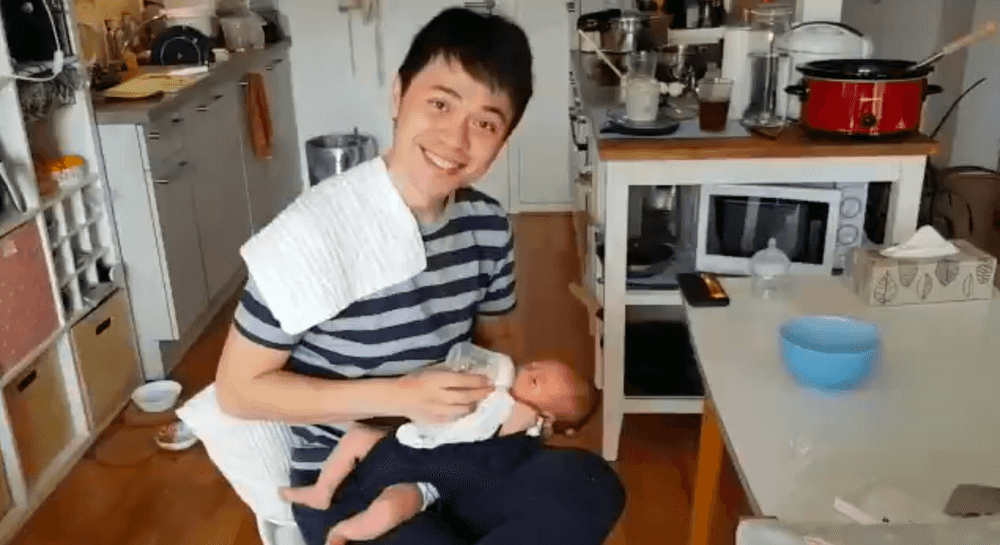 I have months, not weeks, to learn to be an equal partner in parenting in Germany.
I have months, not weeks, to learn to be an equal partner in parenting in Germany.
Related to the first point. The Singapore government has tried to appeal to generations of Singaporeans to have more children and yet the fertility rate has remained solidly under 2.
Here’s a guaranteed solution to low reproduction: provide what Germany provides its residents. For every child born, provide up to 14 months of paid parental leave that can be shared flexibly between mother and father. See how much more relaxed young and fertile Singaporeans will be and watch as things go up.
3. The perfect place is completely subjective
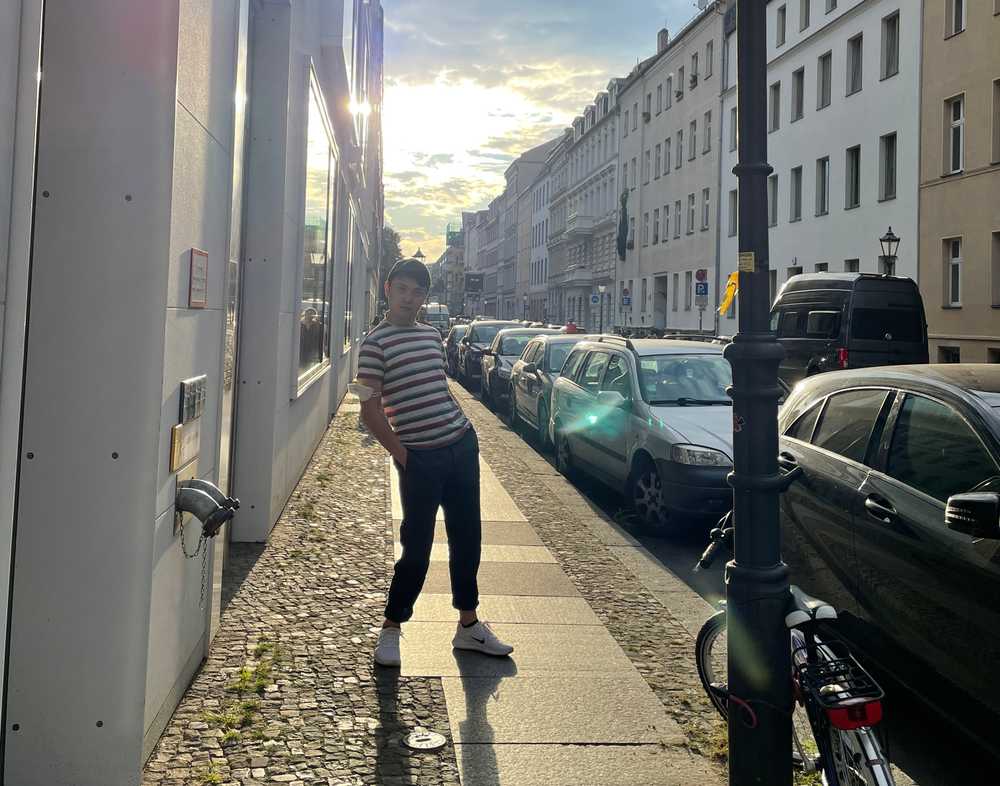 Berlin for me is the place where I can be completely myself. Exhibit A.
Berlin for me is the place where I can be completely myself. Exhibit A.
One thing I learned this year in Berlin that surprised me was how little I understood people. The same place can be viewed from more angles than I can think of.
I have a colleague at work who, like me, transferred from our Singapore office to our Berlin office. Within a year, she asked to be transferred back to Singapore.
When we finally got the chance to talk face-to-face (because of covid) and I asked her why she said that she misses the “community feeling” of Singapore.
Now, if you ask me, I’d say there isn’t a strong community feeling in Singapore. And I’m Singaporean and she’s not! I still feel this way even after I learned what she meant by that.
So there’s that colleague.
Then there’s another colleague who was supposed to go to Madrid with his wife but because of visa reasons, ended up in Berlin, and he likes it enough to want to stay here for a while.
So what’s the learning here? I think it’s this: a place is never bad or good; it’s only ever bad for some and good for others. Oh, and the only you’ll know is if you went there yourself.
4. Reuse culture is possible and it is beautiful
Walking the streets of Berlin, I often stumble on boxes with the words ”Zu verschenken” scribbled on their sides. It means “to give away” in German.
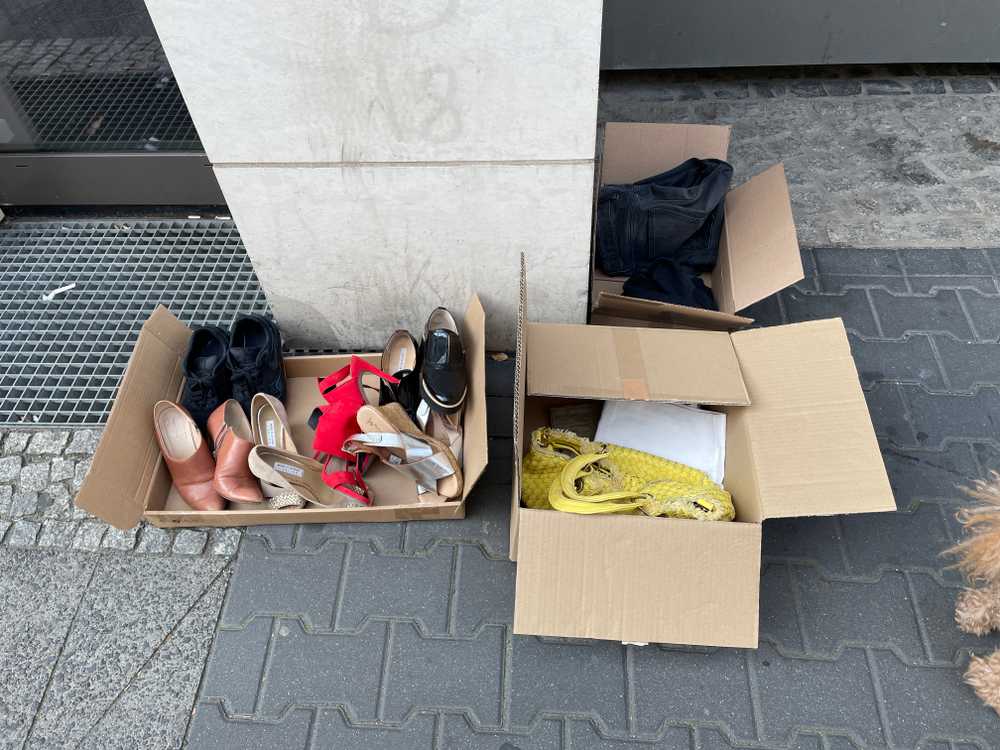 This was a particularly fashionable giveaway, found street-side some five minutes from my apartment.
This was a particularly fashionable giveaway, found street-side some five minutes from my apartment.
Here’s a short assortment of items I’ve picked from these giveaway boxes in the last year:
- Two pairs of branded jeans that happen to fit me
- A formula milk making machine
- An IKEA clothes rack
- Eat Pray Love book (in German)
- Around 10 children’s books (in German)
And it’s not just the free things that contribute to the reuse culture that is so strong in Berlin. It’s also the things that people list on eBay Kleinanzeigen (the classifieds) that are labelled as free or priced very cheaply.
I find it wonderful that many people here would take the time to list items that they are willing to give away for free, just so that those items end up in the hands of people who are guaranteed to use them. I’ve also started doing that this year to contribute to this beautiful culture.
5. Deposits guarantee recycling behaviour
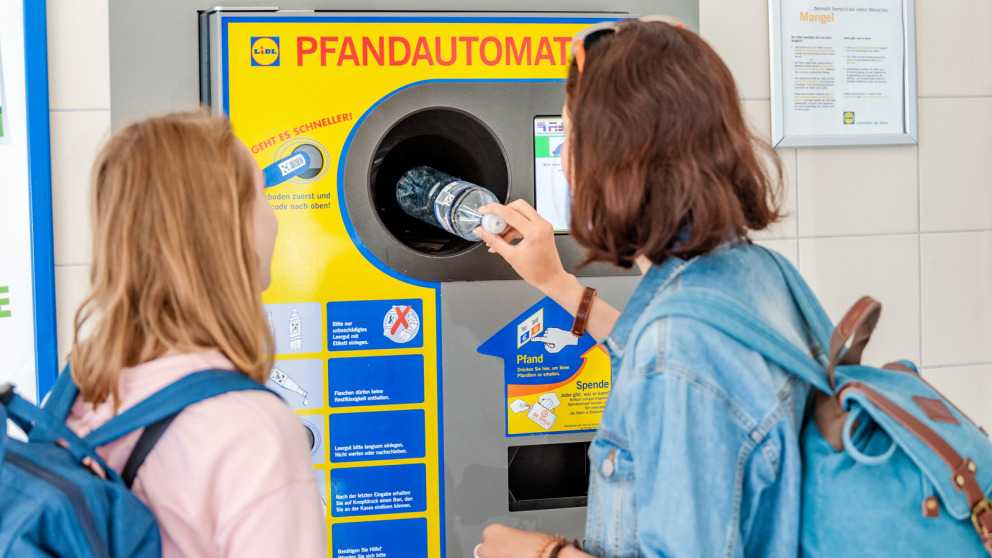 Photo from Institute for Advanced Sustainability Studies (source)
Photo from Institute for Advanced Sustainability Studies (source)
In Germany, many beverages that ship in glass and plastic bottles must be purchased along with a deposit at the supermarket. For example, I bought an isotonic drink that came in a plastic bottle from Edeka the other day and the retail price was 0,89 euros, and at check-out, I had to pay an extra 0,25 euros as a deposit.
This process is seamless and I’ve stopped thinking about how much deposit I’m paying. My brain has been rewired to look at bottles as something valuable to be taken back to the store for money. And it’s not just me — everyone does it here. Of course they do; they want their money back!
A Pfand side effect of this is that you can (and people do) leave your bottles on the street and you would be seen as nobly contributing to wealth redistribution as people will go around the city collecting them for their deposits! (Pfand stands for “deposit,” by the way, and is pronounced like ‘fun’.)
6. Car-sharing is a game changer
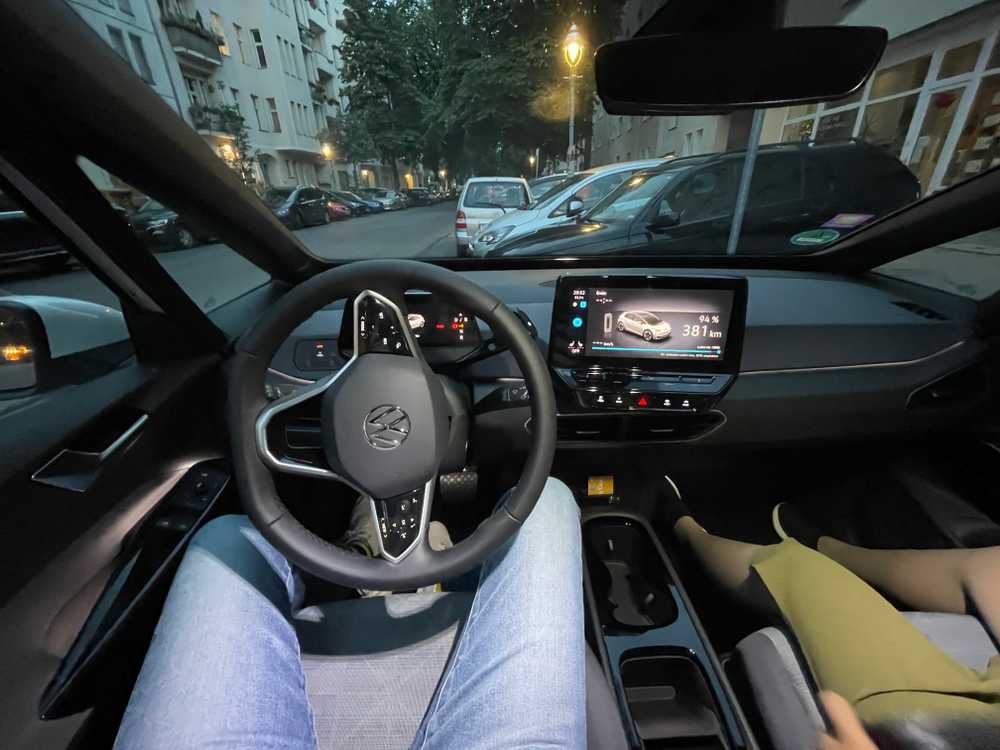 Me sitting inside the VW ID.3 electric car that is part of the all-electric fleet of WeShare in Berlin.
Me sitting inside the VW ID.3 electric car that is part of the all-electric fleet of WeShare in Berlin.
This one is worth writing about in its own article, but briefly: car-sharing is the future. It works, and it works well.
There are many car-sharing companies in Berlin: there’s WeShare (by Volkswagen Group), Sixt, Miles, and Share Now. Every one of these companies operates a fleet of vehicles that are parked throughout the city that anyone with a driver’s license can access through their mobile app.
The beauty of this car-sharing model is that I can drive any time without ever needing to:
- fuel up myself
- fuss with parking at home
- pay for parking when not using
- deal with regular car servicing
- wash and vacuum the vehicle
It’s not just convenient for me as a user. I think letting a business operate the fleet of vehicles that people drive presents a lot of potential savings. They are incentivised to inflate the tires to the correct pressure regularly, for example, reducing the per-kilometre fuel consumption.
A nice bonus for me is that the fleet in Berlin is incredible. (It’s probably because Berlin, Germany; as in, home of Audi, BMW, Mercedez-Benz, Porsche, and Volkswagen.) I drove my first electric cars here, including a BMW i3, Peugeot e-208, Volkswagen ID.3 and e-Golf, and even a Mazda MX-30.
The cherry on top is the economics. My favourite car-sharing company in Berlin is WeShare because their rates are the easiest to understand and the lowest for my kind of use. I pay 10 euros for their monthly subscription called WeShare+ and that makes every rental cost 1 euro to unlock and 0,19 euros per minute. 150km mileage is included and parking anywhere is free.
That means that I can rent an electric car (WeShare operates an all-electric fleet) for 30 minutes and pay just 6,70 euros.
I use all the apps so that I can maximise my chances of finding a vacant vehicle wherever I am in Berlin. Here are my referral links for all the car-sharing apps I’ve been using:
In case you missed it, you can read my first year reflections here.
Update 3.11.2022: I’ve published my third year reflection on Substack. You can read it here.
